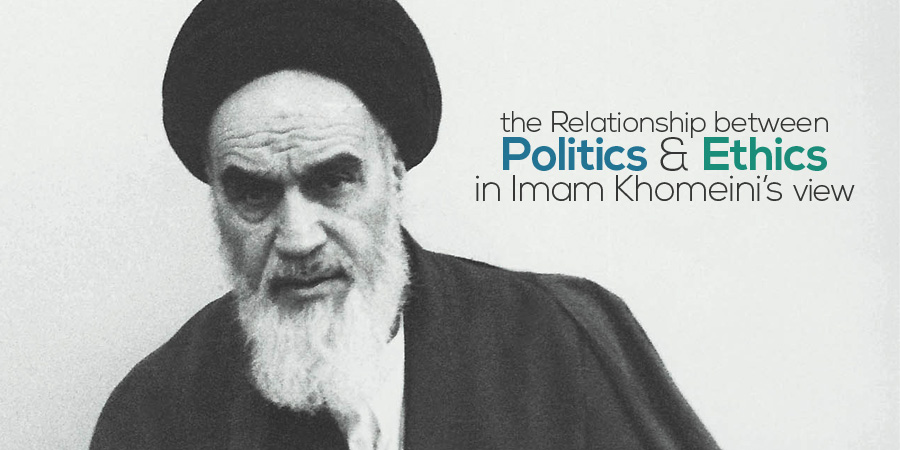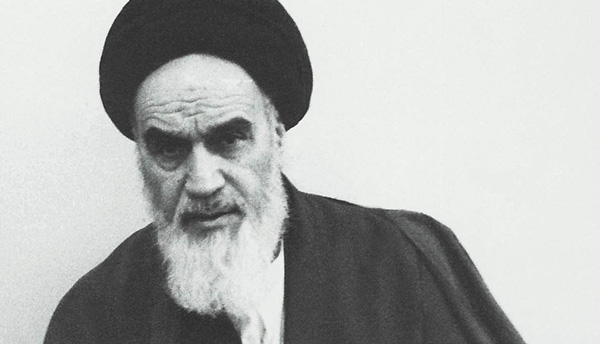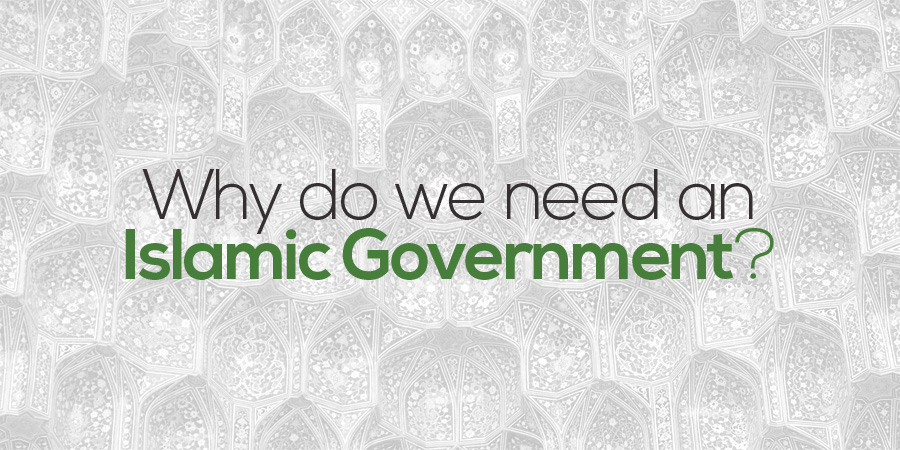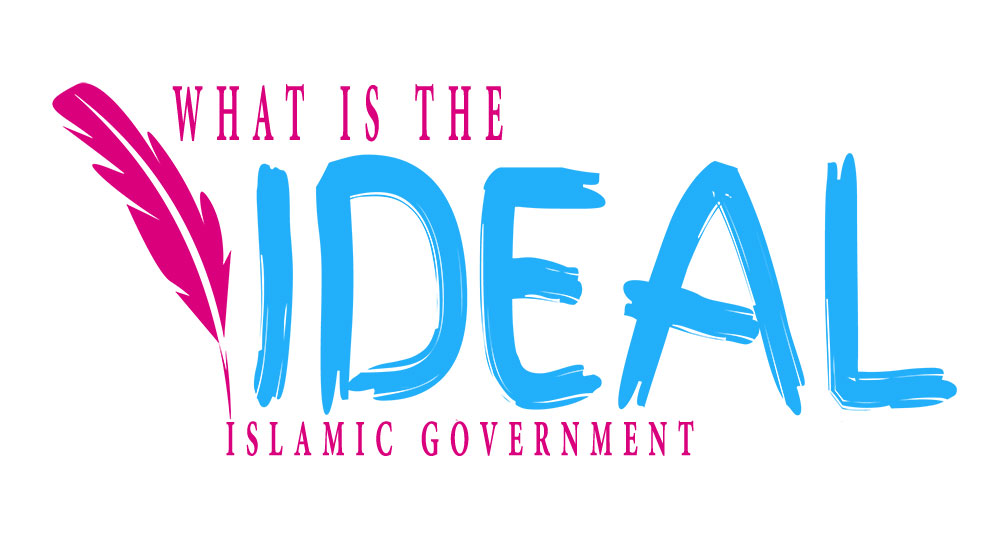What is the Relationship of Politics and Ethics in Imam Khomeini’s view? (2)

The meaning of politics and the status of power
Politics is inextricably intertwined with all the dimensions of our life and it is so palpable and conspicuous that its existence and influence cannot be denied. But, what is politics really? Innumerable descriptions of politics have been advanced. But one thing is certain: politics is related to the acquisition of power or the struggle for the acquisition of power. So, at the core of the concept of politics, ruling (over others) and attempts at exerting influence lie latent.
If such is the meaning of politics, then it cannot be evaded and must be accepted. It is because the requisite of social welfare and well-being of the society lies in the existence of power, and attainment of power is tied to politics. “What is politics by the way? It is the relations between the ruler and the nation, relations between the ruler and the other governments and, I should say, it is to prevent the corruption and mischief that exist. All of these constitute politics and it is so.”[1] If politics is such and forbidding corruption is deemed part of it, then Islam also has politics as it pursues the enjoinment of what is good and the preclusion of what is bad. Hence, the Imām describes Islam itself, thus: “Islam is governance along with its affairs and decrees.”[2] Similarly, the Infallibles (‘a) have always been involved in politics in this sense.
On what day was the Most Noble Messenger (s) concerned with political issues? He (‘a) used to establish a government; he (s) used to resist those who were anti-Islam and oppressed the people; he (s) used to wage war against them.[3]
It was not only the Most Noble Messenger (s) who used to engage in politics in this sense; the aspect of politics was there in all the prophets (‘a). Because, politics means ensuring the interests of the people, and the prophets (‘a) used to perform this duty in the best manner.
Politics means guiding the society and showing the way; it means considering all the interests of the society, and taking into account all aspects of man and society and guiding them toward the things that are best for them, for the nation and the individuals. This is exclusive to the prophets (‘a).[4]
Politics in this sense has been the principal axis of movement of all the prophets (‘a) and no religion can be regarded as alien and distant from it.
But, the most essential element of politics is power. However, power is something that is frightening. It misleads man as well as disenchants him, that the nature of power corrupts man. A person who feels powerful rebels, and forgets himself, as well as his being a servant of God, and nourishes an illusion of godhood. The story of Pharaoh is not a mere historical account.
Everybody has a ‘Pharaoh” within himself and awaits a favourable opportunity and situation to beat the drum of divinity for himself. François Mitterrand, the former President of France who spent his life in obtaining, preserving and extending power, says about this phenomenon, “I think that power is always a dreadful thing; the one who possesses power should—if not fear—be at least extraordinarily heedful of the nature and extent of his particular role.”[5]
Power is prone to excesses and does not stop at a certain point. If the instinct of power-seeking is given free rein, its expansion and spread, then, can no longer be prevented. Because of this, many people, the mystics in particular, have greatly feared and evaded power owing to its corruptive quality. The following story about an ascetic with the name of Ki Yuyu shows the depth of this fear and evasion:
One day, an emperor of ancient China said to a certain master of Zen named Ki Yuyu, “You are a very great man. I like to transfer the imperial throne to you after my death. Do you accept?”
Ki Yuyu was extremely annoyed and only said, “These words defiled my ears.”
Then, he left so as to wash his ears in the nearest river. While heading toward the river, he was talking to himself: “Today I have heard impure words.”
His friend, along with a cow, came to the river and asked him, “Why are you washing your ears?”
Ki Yuyu replied, “Today, I am very displeased. An emperor wants me to be his successor. He offered the imperial crown to me, and my ears have been polluted by these words. I have to wash them.”
His friend said, “I was supposed to let my cow drink from this limpid water, but now this water has been contaminated.”[6]
The view of our mystics on power has been usually a negative one. They consider the forestalling of power as the alternative to unbridled power. By reflecting on the spirit of men they have realized that only a few can withstand the enticement of power and not become its captive.
In the words of the Imām, the Hitlerian makeup and his mania for power exist in the mind of everyone. “Hitler was ready to annihilate the whole of humanity and make himself stay in power in Germany. The superior race and that which was in the mind of Hitler are in the minds of all of you. You have made yourselves unwary.”[7] Can it be concluded from this matter that power is evil in itself?
In reality, the claim of those people is that since power has unpleasant repercussions such as excesses, injustice and insolence, it follows then that one must eschew it totally. This view has been propagated by many of the Muslim mystics and it has been one factor in the decadence of the Muslim societies. But if gluttony has dire consequences, it cannot be concluded that food must be absolutely discarded.
If abundant wealth is corruptive, one cannot reject it totally and abandon the same. As in the previous discussion on instincts, the way of approaching the insolence of instincts is not to uproot them, but to guide them. On the issue of power too, the same approach must be adopted. Keeping aloof from the detriments of power by giving it up cannot be realized.
The evils should be identified and their emergence prevented. Mitterrand who himself speaks about the dangers of power, regards the solution to lie in controlling and guiding it, and in his words, in acquiring anti-power. “If the one who is in power… is of sound reasoning, he will search for anti-powers.”[8]
This anti-power can prevent the excesses of power as well as the corruption of the power-holder. It can be within a person, and is called ‘conscience’ according to Mitterrand: “Some of my powers only rely on my conscience.”[9]
But one should not content himself with this anti-power; rather, “the society, likewise, ought to bring into existence anti-powers within the framework of its institutions.”[10]
In other words, power should be controlled through the mechanisms of distribution of power, the partnership of the people, and the supervisory bodies. Nevertheless, between these two types of anti-power, it seems that the internal anti-power has primacy. As, sometimes, the power-holder is in such a position of strength that he can neutralize all the social anti-powers. It is here that “the only brake that exists for his actions is the one within him.”[11]
Therefore, according to Weasel, it can be deduced that “the true power is that power which man exercises on his self.”[12] It is this point that can be regarded as among the axiomatic truths of Islamic ethics and mysticism. It is only through internal edification and dominance over the self that power can be properly handled and its perils avoided.
In the opinion of the Imām, the essence of power is an attribute of perfection and God also possesses this attribute in its absolute sense. “Power is a form of perfection in itself. God, the Sublime and Exalted, is powerful.”[13] As such, one should not shun power. Instead, he should understand it and benefit from it, in an optimal way, and the proper way of benefiting from something, in the view of the Imām, is internal refinement. Thus, he stands on the proposition that in case it is acquired by unrefined individuals, power is dangerous. In case power is obtained by corrupt persons, this same perfection will lead him to corruption.[14]
Yes, all the evils that are found in the world arise from egocentrism. Craving position, desire for power, love of riches, and the like—all of them spring from self-love, and this ‘idol’ is the biggest one, breaking which is also far more difficult than everything else.[15]
Therefore, in the intellectual code of the Imām, power ought not to be feared or evaded. Rather, it should be properly utilized, nourished and embellished; by means of relentless trimming of the extra branches of power, its possible centralization and absolutism can be parried.
Written by Sayyid Hasan Islami
Translated by Mansoor L. Limba
References:
[1] Ibid., vol. 1, p. 271.
[2] Al-Bay‘, vol. 2, p. 472.
[3] Sahīfeh-ye Imām, vol. 15, p. 214.
[4] Ibid., vol. 13, p. 432.
[5] Khātirāt bā Dū Sidā: Kuftigū-ye Ely Weasel bā François Mitterrand [Memoirs with Two Voices: Dialogue between Ely Weasel and François Mitterrand], trans. ‘Abbās Āgāhī (Tehran: Daftar-e Nashr-e Farhang-e Islāmī, 1377 AHS), p. 171.
[6] Del-Ārā Qahremān, Sad Hikāyat-e Zen [Hundred Zen Stories] (Tehran: Nashr-e Mītrā, 1377 AHS), p. 143. See Reginald Huras Blithe, Dars-hāyī az Ustādān-e Zen [Lessons from Zen Masters], trans. Nasrīn Majīdī (Tehran: Hīrmand, 1379 AHS), p. 140.
[7] Sahīfeh-ye Imām, vol. 14, p. 379.
[8] Khātirāt bā Dū Sidā [Memoirs with Two Voices], p. 171.
[9] Ibid., p. 177.
[10] Loc. cit.
[11] Ibid., p. 183.
[12] Loc. cit.
[13] Sahīfeh-ye Imām, vol. 18, p. 206.
[14] Loc. cit.
[15] Ibid., vol. 19, p. 250.




